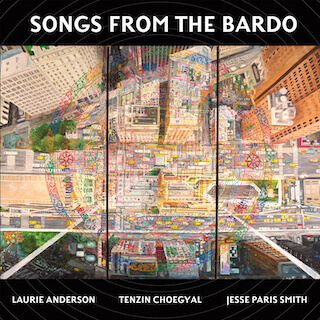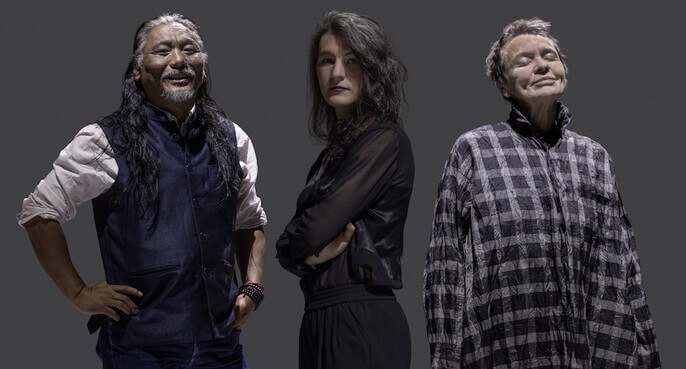Smithsonian Folkways has announced the release of Songs from the Bardo, a collaborative long-form composition by multimedia artist Laurie Anderson, Tibetan singer and multi-instrumentalist Tenzin Choegyal, and activist and composer Jesse Paris Smith, to be released September 27. The piece, first performed as a mostly improvisatory performance at New York’s Rubin Museum of Art, is a guided journey through the visionary text of the Tibetan Book of the Dead. Over the course of a single, 80-minute ebb and flow of sound and words, this unique assemblage of artists, joined by cellist Rubin Kodheli and percussionist Shahzad Ismaily, has created a transporting experience, meant to draw the listener into the present moment and provide a framework for inner exploration.
Laurie Anderson’s voice, and its subtle concoction of gravity and grace, is a central sonic element of Songs from the Bardo. Her narration acts as a beacon for the karmic imprint of all beings as they experience the ultimate transformation of one life into what comes next. “Homage to the gurus,” she begins with a weightless solemnity as she invokes Amitābha, the Buddha of Infinite Light. Throughout her artistic career, which extends beyond music, sculpture, and immersive virtual reality experiences, Anderson has incorporated elements of her personal Buddhist practice, but never as explicitly and with such depth as she does on Songs from the Bardo. Throughout the recording, her experiential understanding of Buddhist philosophy is demonstrated through her expressive capabilities, as her intonation and articulations reflect the confusion, fear, and quiet ecstasy that the text evokes. “Do not be afraid of the brilliant light, luminous and clear, sharp and bright,” she speaks with a disconnected calm before bearing down, “Recognize them as wisdom.”
Tenzin Choegyal and Jesse Paris Smith, along with cellist Rubin Kodheli, craft a panoramic musical counterpoint that purposefully drifts in and out of the foreground, often dissolving into silence from grand crescendos of triumphant song. Choegyal, who was born into a family of Tibetan nomads forced out of their homeland and exiled in India, explains in the album’s liner notes, “I have tried to channel the wisdom and traditions of my ancestors through my music in a very contemporary way while holding the depth of my lineage.” He incorporates lingbu (a Tibetan bamboo flute), dranyen (a stringed, lute-like instrument), as well as singing bowls, gong, and his own voice, recontextualizing ancient musical heritage inside this new sonic landscape. Smith, who comes from her own musical traditions as the daughter of punk icon Patti Smith, guides the journey forward through expressive piano playing and the creation of beds of drone using a collection of crystal bowls.
Though Songs from the Bardo is intended as introspective, something personal and to be experienced with solitude, the roots of the project lie in shared activist work. Smith and Choegyal met in 2008 at the annual Tibet House US Benefit Concert at Carnegie Hall, raising money to preserve the endangered Tibetan culture and traditions. The pair first discussed creating a work based on the Tibetan Book of the Dead after the 2014 benefit, and the trio performed a shortened version of Songs from the Bardo at the 2015 edition. Smith is now a member of the Associate Board of Tibet House US, and all three musicians have performed at the organization’s yearly benefit multiple times.
This shared love and devotion of Tibetan culture and Buddhist tradition is at the root of Songs from the Bardo. Laurie Anderson, Jesse Paris Smith, Tenzin Choegyal, and Rubin Kodheli have created a piece of music that transcends time by creating an environment in which to lose one’s self, to imagine a space outside of sensory experience. But they also suspend time in a larger sense; by exploring the millennia-old ideas contained in the Tibetan Book of the Dead through a contemporary, exploratory lens, one based equally in spontaneity and repose, it reveals the still very much relevant wisdom contained within. These musicians build a bridge between then and now by illuminating death, the one constant in the impermanent human experience.
The musicians would like to thank Michael Askill for his inspiration in the creation of this work.

Track Listing:
01 Homage to the Gurus
02 Heart Sutra Song – Gone Beyond
03 Awakened One
04 The Three Jewels
05 Brilliant Lights
06 Listen Without Distraction
07 Gong
08 Dancing with the Crescent Knife
09 Jigten
10 Natural Form of Emptiness
11 Lotus Born, No Need to Fear
12 Dividing Line
13 Moon in the Water
14 Awakened Heart

